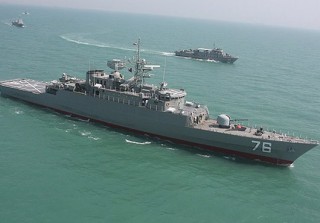Pirates hit chemical tanker off Somalia

A chemical tanker has been attached by suspected pirates off the coast of Somalia in the first such incident in more than two years.
The European Union Naval Force (EU Navfor) reported that the chemical tanker CPO Korea was reported as being attacked by six armed men 330 nautical miles off the east coast of Somalia on 22 October. Although it happened last month, the EU Navfor only announced the attack on 4 November after “a thorough investigation into the incident”.
During the attack a number of shots were exchanged between the six armed men, who were in a fast-moving skiff, and the armed security team on board CPO Korea. The suspected pirates eventually broke away after CPO Korea’s crew successfully implemented self-protection measures by increasing speed, altering course and rigging fire hoses to thwart the attack. CPO Korea was able to continue her transit in the Indian Ocean, with no casualties reported.
“This is the first reported attack on a merchant vessel off the coast of Somalia in two and a half years. It comes after 26 hostages from fishing vessel, Naham 3, were released on 22 October after being held by Somali pirates for four and a half years,” the EU Navfor said.
Pirate attacks in the Gulf of Aden and Indian Ocean surged in 2008 and by January 2011 over 700 hostages and 30 vessels were being held by Somali pirates. Due to 24/7 counter-piracy naval patrols, together with self-protection measures implemented by the shipping industry, piracy attacks have been suppressed in recent years.
Speaking about the attack on CPO Korea, the Operation Commander of the EU Naval Force (Somalia), Major General Rob Magowan CBE, said “This attack shows that pirates still have the intent to attack ships for ransom and cause misery to seafarers and their families. It is imperative that the international community remains vigilant. The EU Naval Force is working with counter-piracy partners to coordinate efforts to ensure pirates do not once again terrorise the waters off the Somali coast.”
The vessel owner also commented: “We, Offen Tankers would like to express our appreciation and thanks to the crew and security team for safeguarding the crew, vessel and the environment by defending this pirate attack in a very professional manner. Despite the decreasing number of attacks in the region the imminent risk of Somalian piracy still exists and needs to be addressed accordingly by owners and charterers alike.”
In addition to the risk of piracy off the Somali coast, ships off the Horn of Africa have been coming under attack from Yemen. Shipping group Teekay said its LNG (liquefied natural gas) tanker Galicia Spirit “experienced a suspected piracy attack whilst off the coast of Yemen” on 25 October.
“No third parties managed to board the vessel during the incident and all crew members are safe and have been accounted for,” Teekay said in a statement.
The incident was the first attack on a commercial ship since July after missile attacks in recent weeks on military craft, including US navy vessels, which were launched from Yemen.
British maritime security firm MAST said a small vessel had approached the tanker and fired a rocket propelled grenade (RPG), Reuters reports. “MAST understands that the vessel had no armed security team on board, and that the vessel sustained small arms fire as well as the RPG,” it said. “It is unclear whether this is a terrorist attack or piracy.”
At the end of October the International maritime Bureau (IMB) noted that there is a 20 year low in piracy on the world’s seas but that kidnapping and hostage-taking persists off the coasts of West Africa and South East Asia. The IMB’s latest global piracy report shows that pirates armed with guns or knives took 110 seafarers hostage in the first nine months of 2016, and kidnapped 49 crew for ransom. Nigeria, a growing hotspot for violent piracy and armed robbery, accounts for 26% of all captures, followed by Indonesia, Malaysia, Guinea and Ivory Coast.
“But with just 42 attacks worldwide this quarter, maritime piracy is at its lowest since 1996. IMB’s Piracy Reporting Centre (IMB PRC) has recorded 141 incidents so far this year, a 25% drop from the same period in 2015. A total of 111 vessels were boarded, five were hijacked, 10 were fired at, and a further 15 attacks were thwarted,” the IMB said.
“As for Somalia, zero incidents were recorded this quarter and just one attempted attack was recorded in the Gulf of Aden in the first nine months of 2016. But the situation ashore in Somalia, from where the pirate vessels set off, remains fragile,” the IMB said, and called on shipmasters to follow the industry’s Best Management Practices and continue to remain vigilant as they sail through waters off Somalia.